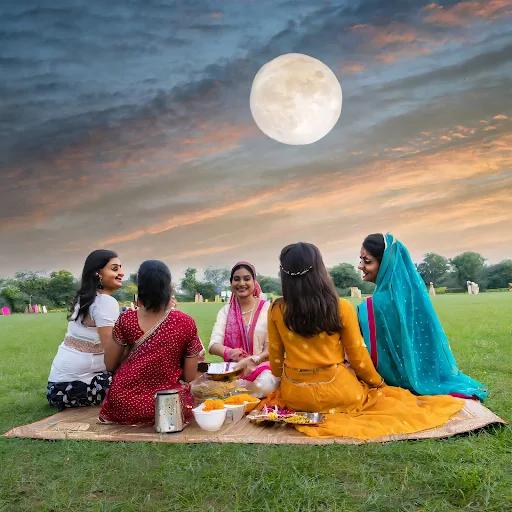Karva Chauth is a traditional Hindu festival that holds a special place in the hearts of married couples in India. This significant celebration is marked by fasting, prayers, and a deep display of love and commitment between husbands and wives. Let's dive into the rich tapestry of Karva Chauth, exploring its origin, religious and cultural significance, and the role of society in its celebration.
 |
| Women celebrating Karwachauth. Image generated via Adobe Firefly |
The Origin of Karva Chauth:
Karva Chauth traces its roots to ancient India and is believed to have originated in the northwestern regions of the country. The word "Karva" refers to an earthen pot, while "Chauth" means the fourth. The festival falls on the fourth day of the waning moon in the month of Kartik according to the Hindu lunar calendar, usually in October or November.
Religious Significance:
Karva Chauth is primarily celebrated by married Hindu women. It's a day when wives fast from sunrise to moonrise, without even drinking water. The fast is kept for the long life, well-being, and prosperity of their husbands. The day is marked by a series of rituals, including applying henna on hands, dressing in colorful attire, and listening to the Karva Chauth Vrat Katha (a traditional story) in the evening.
Cultural Significance:
The cultural significance of Karva Chauth is profound. It is seen as an opportunity for married couples to strengthen their bond. Women dress up in bridal finery, which adds to the festive atmosphere. The fast, which spans the entire day, showcases their devotion and love for their husbands.
Purpose and Celebration:
The primary purpose of Karva Chauth is for women to pray for the well-being and longevity of their spouses. Married women keep a strict fast throughout the day, refraining from food and water. They only break their fast once they spot the moon, typically with their husbands present. The moon is considered a symbol of good luck and a harbinger of positive change.
Husbands, in return, often buy or prepare special gifts for their wives as a gesture of appreciation for their dedication and sacrifice. The sight of the moon, and sometimes the husband's face, is seen through a sieve, and water is offered to the moon as a part of the rituals before breaking the fast.
Role of Society:
The celebration of Karva Chauth is not just an individual affair; it's deeply ingrained in the social fabric. The society plays a significant role by creating a supportive and festive atmosphere. Friends and family often come together, and women gather in groups to perform the rituals collectively. The fasting women share stories, sing songs, and encourage each other throughout the day.
In modern times, Karva Chauth has evolved, and many husbands also fast alongside their wives in a display of solidarity. It's not just a celebration of love between couples but also an occasion for social bonding and strengthening relationships within the community.